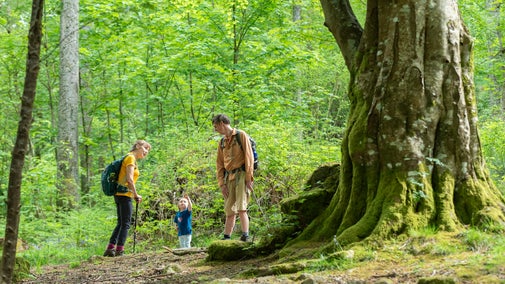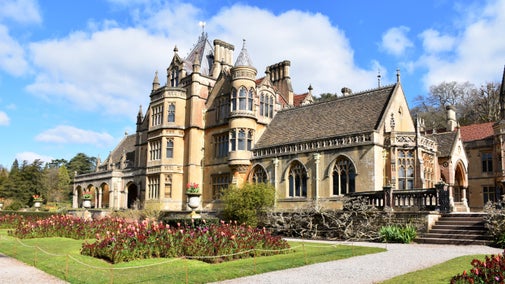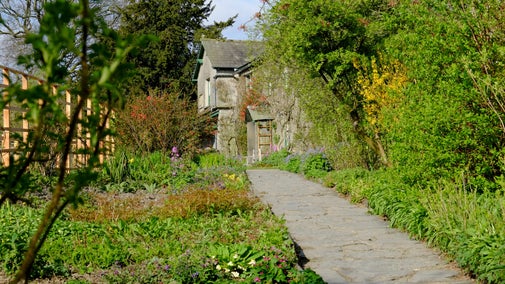
Discover more at Borrowdale and Derwent Water
Find out how to get to Borrowdale and Derwent Water, where to park, the things to see and do and more.

Derwent Island and House are open to visitors five days a year. Find out all you need to know about the visit and how to get the most out of your day. There’s a canoe trip to and from the island, a guided tour of the house and free time to explore the island.
Due to staff shortages, we will be unable to run open days at Derwent Island this year. We hope to once again be able to welcome visitors in 2026.
Derwent Island is one of the Lake’s most fascinating treasures. The 18th-century house on this little wooded island makes this the only inhabited island in the Lake District which opens to visitors.
It’s lived in all year round but open to the public for five days every year, giving you the opportunity to have a look around the house and garden and find out about island life past and present.
Book online on our events page or call 0344 249 1895. Please note a booking fee of 5 per cent per ticket applies to all customers.
When booking your tickets you can choose whether to print your own or have them sent to you through the post. Whichever you choose, please bring them along with you on the day.
Crossing times are fixed and please be sure to arrive in good time.
The closest parking is Keswick Lakeside car park, Lake Road, CA12 5DJ. This is a pay and display car park (not National Trust).
You will need to purchase a minimum of three hours parking to allow you enough time to and get to and from the island. Parking prices are listed on the Parkopedia website. You can pay by phone.
The lake level of Derwent Water changes so quickly, so the most reliable way of getting to the island is by canoe.
Don’t worry if you’ve never canoed before. We use a local licensed outdoor provider who provide two qualified canoe instructors to give you help and advice.
The canoes are six Canadian ‘open boat’ style canoes, bound together in pairs as three ‘rafts’ which makes them very stable and easier to paddle.
Please note: you will need to paddle, but with six people per canoe raft, no one person has to work too hard. It takes approximately five minutes of paddling at a leisurely pace to reach the island.
Getting in and out of the canoe may involve getting your feet wet and/or muddy, so you might want to bring a change of shoes.
The instructors will give you a full safety briefing and instructions on how to use the paddle and will help you get in and out of the canoes. They will also supply buoyancy aids and paddles.

When you arrive on the island you will be greeted by a tour guide who will give you a 45-minute guided tour of the main show rooms in the house. After the tour, the island is yours to explore for the remaining time until your canoe trip back.
We can fit 18 people in the canoes, so access to the island is by timed tickets which gives you about 2½ hrs on the island.
The first 45 minutes is a guided tour of the main show rooms in the Georgian house with one of our knowledgeable guides. The remaining 1¾ hrs is yours to explore at your own pace and experience the sense of tranquillity on the island.
We very much welcome children at the Derwent Island Open Days, but for safety reasons we have to ensure that there are no more than two children for every adult participating. We ask that you please keep this in mind when booking tickets for children.
The only way visitors can access the house is by guided tour. The tour of the house is 45 minutes long. We have some handling objects for children as part of the tour, but the simple truth is that 45 minutes of listening isn’t every child’s idea of a good day out.
Families who have visited say that they think it works for children aged eight and over, but you’ll know best whether your child will enjoy joining a guided tour.
If you feel that your child won’t enjoy the guided tour, you’re welcome to visit the island and miss out the house. Outside, we have a children’s quiz with a map to help them explore the whole island, and lawn games including croquet, boules and giant dominoes.
Please note that due to the size of the smallest buoyancy aid, we are unable to take children under the age of six in the canoes.
There is a unisex toilet available for visitors on the island in the Garden Room, formerly part of the cellars of the mansion.
When we have enough volunteers, we are able to offer tea, coffee and cakes in the Garden Room; unfortunately we are not able to guarantee that we can offer refreshments every open day.
Lunches are not available on the island, but you are welcome to bring your own picnic or have lunch at the Theatre by the lake café before or after your visit.
There are two rooms to shelter from rain while you’re on the island: the Garden Room and the Chapel.
The open day is mostly an ‘outdoor’ experience though, so please bring waterproofs and come prepared for the Lake District weather.
Sadly we are not able to accommodate dogs on the island.
If there's anything not covered by this article, please call the information line on 017687 74649 to speak to a member of staff.

Find out how to get to Borrowdale and Derwent Water, where to park, the things to see and do and more.

Take in the views from Friar’s Crag and visit historic sculptures on a lakeside walk around Derwent Water or set off from Keswick to explore the surrounding woodlands and fells.

Discover the top things to see and do during your visit, including scenic walks, ancient woodlands, far-reaching views and famous Lakeland highlights such as the Bowder Stone

Take to the water for a spot of canoeing, paddleboarding or paddling. The islands of Derwent Water are waiting to be discovered

Discover the internationally significant ‘Atlantic oakwoods’ and Derwent Water which support a variety of rare species of plants and animals, including the red squirrel and vendace.

The Bowder Stone, Borrowdale Yews and Castlerigg stone circle have stood watching the Borrowdale valley evolve around them. Discover the history of these ancient residents.

Historic buildings are a treasure trove of stories, art and collections. Learn more about their past and plan your next visit.

Alongside its natural outdoor wonders the Lake District also has many inspiring houses and buildings to visit, from the impressive Allan Bank where Wordsworth once lived, to the former farmhouse of Beatrix Potter.